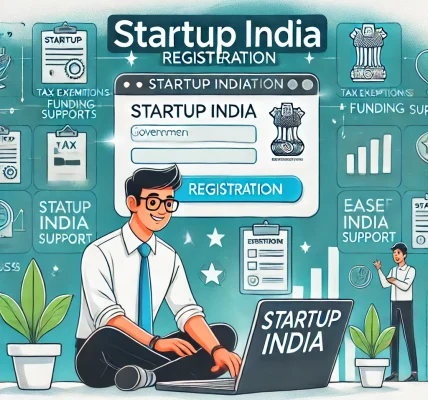Technology and Innovation Grants for Startups in India: A Comprehensive Guide
India has witnessed a remarkable growth in its startup ecosystem, with thousands of startups being established every year across various sectors. This growth is driven not only by the entrepreneurial spirit but also by the government’s supportive initiatives, especially the Technology and Innovation Grants. These grants, available under various schemes, are designed to boost innovation and technological advancements within the startup ecosystem, creating a conducive environment for research and development (R&D).
In this blog, we will explore the details of these grants, how they benefit startups, and the key government schemes like iStartup and MSME that offer financial aid for technological innovation.
Understanding Technology and Innovation Grants
Technology and Innovation Grants are financial assistance programs provided by the government to encourage startups to develop cutting-edge technology and innovative solutions. These grants help reduce the financial burden on startups, allowing them to invest in new products, services, or technologies. The funding is often aimed at R&D activities, product development, and scaling operations.
The Indian government, through its various ministries and departments, has designed several schemes that offer grants, loans, and funding options to promote innovation. These grants are designed to help startups create competitive products and services that can thrive in the global market.
Key Government Schemes Supporting Technology and Innovation Grants for Startups
1. iStartup Scheme
Launched by the Government of Rajasthan, the iStartup Scheme aims to nurture innovation and support early-stage startups in the state. The scheme offers financial grants, mentoring, and other support services to help entrepreneurs develop innovative solutions.
Under this scheme, startups can receive financial assistance for product development, marketing, and scaling. The grant amount varies depending on the nature and scope of the project, but it helps reduce the initial financial burden on entrepreneurs. The key features of the iStartup Scheme include:
- Financial Grant: Eligible startups can receive up to INR 50 lakhs as a grant for product development and scaling.
- Innovation Support: The scheme provides an ecosystem where startups can collaborate with academia, research organizations, and technology experts.
- Incubation and Acceleration: It offers incubation support, mentorship, and networking opportunities for growth and market penetration.
- Fiscal Benefits: Startups can avail of tax exemptions and other fiscal incentives.
2. MSME Technology Development Program
The Ministry of Micro, Small, and Medium Enterprises (MSME) plays a crucial role in fostering innovation through its Technology Development Program. This program aims to enhance the technological capabilities of MSMEs and startups by providing financial assistance for the development and adoption of new technologies.
The program provides the following benefits:
- Technology Upgradation: MSMEs and startups can receive grants for modernizing their manufacturing processes and adopting new technologies.
- Training and Awareness: The program also funds training sessions for entrepreneurs to make them aware of the latest technologies and trends.
- Support for Innovation: Financial assistance is available for research, innovation, and product development, enabling startups to bring unique solutions to market.
Startups in the technology and manufacturing sectors, in particular, can benefit greatly from this program.
3. National Initiative for Developing and Harnessing Innovations (NIDHI)
The National Initiative for Developing and Harnessing Innovations (NIDHI) is an initiative under the Department of Science and Technology (DST) that focuses on supporting startups engaged in technology development. It provides financial grants, venture funding, and incubation support to entrepreneurs working on innovative technologies.
The key components of the NIDHI scheme include:
- Seed Support System: NIDHI helps startups with seed funding to take their innovative ideas from the concept stage to the market.
- Innovation Labs and Incubators: The scheme provides access to state-of-the-art innovation labs and incubation facilities to help startups develop their ideas.
- Mentorship: Startups receive guidance from experienced mentors to help them refine their products and ensure they meet market needs.
4. Startup India Scheme
Launched by the Government of India, the Startup India Scheme is one of the most comprehensive programs for supporting innovation and entrepreneurship. While the scheme is not solely focused on technology and innovation grants, it offers several incentives and benefits for startups involved in technology development.
The Startup India Scheme offers:
- Tax Exemptions: Startups are eligible for tax holidays and other fiscal incentives for up to three years.
- Financial Assistance: The scheme also facilitates easy access to funding for R&D and product development through various funding agencies, including venture capital and angel investors.
- Innovation Challenges: Startups can participate in various innovation challenges organized by the government, which offer monetary rewards and recognition.
5. Atal Innovation Mission (AIM)
The Atal Innovation Mission (AIM), initiated by the NITI Aayog, aims to foster a culture of innovation and entrepreneurship in India. AIM promotes the establishment of Atal Incubation Centers (AICs) and Atal Tinkering Labs (ATLs), providing financial grants and support to startups engaged in technological innovations.
Key highlights of the AIM include:
- Incubation Support: Startups can receive incubation support through AICs, which provide funding, mentorship, and infrastructure for growth.
- Tinkering Labs: ATLs offer a platform for schoolchildren and entrepreneurs to work on new ideas and technologies, fostering a spirit of innovation from a young age.
- Innovation Challenges: AIM hosts various innovation challenges and competitions that provide cash prizes and support for startups.
Eligibility Criteria for Technology and Innovation Grants
While each scheme has its specific eligibility criteria, certain general conditions apply across most of the government funding programs:
- Business Entity: The startup must be a registered business in India, with a focus on innovation or technology development.
- Technology Focus: The startup must be engaged in the development of new or innovative technologies, products, or services.
- Scalability: Startups should have the potential for scalable growth, with a viable business model and marketable products.
- Timeframe: Many schemes have a specific timeline for application submission, so startups must ensure they meet the deadlines.
- Compliance with Regulations: Startups must comply with all necessary regulatory frameworks, including intellectual property rights, environmental regulations, and tax laws.
How to Apply for Technology and Innovation Grants
To apply for these grants, startups generally need to follow these steps:
- Choose the Right Scheme: Identify which government scheme aligns with your startup’s goals and technology focus.
- Prepare a Business Plan: Draft a detailed business plan, including the technological innovation, product development roadmap, financial projections, and scalability potential.
- Submit Application: Follow the specific application process of the scheme you’re applying to. This often includes submitting online forms, required documents, and business proposals.
- Provide Proof of Concept: Many schemes require proof of concept, prototypes, or working models of your technology or product.
- Pitching: In some cases, you may need to pitch your business idea to a panel of experts or government representatives.
Benefits of Technology and Innovation Grants
The technology and innovation grants provided under various schemes bring several benefits to startups:
- Reduced Financial Burden: Grants and funding help startups minimize the initial financial burden and invest in R&D, innovation, and product development.
- Mentorship and Networking: Startups gain access to a network of mentors, experts, and other entrepreneurs, providing valuable insights and guidance.
- Access to Infrastructure: Some schemes provide access to cutting-edge research labs, incubators, and technical resources.
- Market Expansion: Government grants often come with market linkage support, helping startups reach global markets and scale their products.
- Increased Credibility: Being part of a government-backed scheme enhances the credibility of the startup, attracting investors and partners.
Challenges Faced by Startups in Accessing Grants
While there are numerous benefits, startups may also face challenges in accessing these grants:
- Complex Application Processes: The application process for some grants can be cumbersome and require significant documentation, which may be challenging for early-stage startups.
- Competition: Many government schemes have a large number of applicants, making the competition fierce. Only the most innovative and scalable projects are selected.
- Delayed Disbursements: Some startups face delays in receiving grant disbursements, which can affect their ability to carry out timely research and development.
Conclusion
Technology and innovation grants provide startups in India with a much-needed financial boost to innovate and compete on a global scale. By leveraging government schemes like iStartup, MSME, and others, startups can reduce the financial strain associated with R&D and technology development. The availability of funding, mentorship, and infrastructure support enables entrepreneurs to bring their ideas to life and scale their businesses effectively.
If you are a startup looking to drive innovation, exploring these grants and applying for the relevant schemes can be an excellent step towards success. Always remember to carefully read the eligibility criteria and application process, and ensure your proposal stands out to gain maximum benefits from the grants available.




